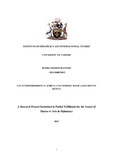| dc.description.abstract | Terrorism has been a dark feature of human behaviour since the dawn of recorded history.Africa cannot help but be drawn into the fight against terrorism, bearing that it is a phenomena that has plagued its land for long. Terrorist organizations in Africa, pose an increasing threat to regional peace and security. The degree to which they become more transnational also raises grave concern to the international community.
Building a resilient society in which individuals and communities are able to withstand violent extremist ideologies and challenge those who espouse them. There is no quick fix for the level of radicalization seen in Kenya and the continent at large. Developing an effective, long-term counter-radicalisation and de-radicalisation strategies that will reduce the appeal of radicalism – and de-radicalisation – persuading people who are already in radical organisations to leave them – are long-term processes that require tact and patience.
This study intends to illustrate how radicalization is viewed and perceived in societies and how it has created ample breeding and recruiting ground for terrorists.The target population in this study was residents of Nairobi city who were of the age of eighteen years and above. The study targeted 90 respondents and 78 successfully participatedin answering questionnaires, together with one focused group discussion and an interview with a key informant.
From the study findings, it was established that a big number of Kenyans are aware of terrorism and radicalisation activities in the country, with economic drivers being highly rated as the major causal priority, followed by religious, then political and other social factors.The study concluded that Kenyan in one way or the other have been affected adversely by terror activities be it loss of lives, properties or employment.It also settles that religion plays a critical role in propagating radicalisation, even though the exploits of terror are more political and location specific.
Media plays a critical and important role in knowledge and information sharing among the public, and this can be employed to counter the radical rhetoric through appropriate programming and informing the public.
There is need for review of security laws and policies in the country, and establish an inter-command security unit as an appropriate measure. The government is called to task to deal with the issue of youth unemployment in the country which has become an exploiting ground for those conscripting for terror groups. There is also need for the government to form an effective and appropriate counter-narrative to terrorism and radicalisation regarding that most policies and interventions cannot only work in a vacuum. | en_US |

